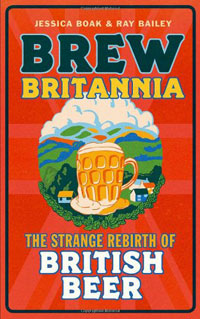 In 1977 in Dorset, a town in the south of England where Thomas Hardy’s Ale was first brewed in 1968, a splinter group of the Campaign for Real Ale calling itself The Real Ale Liberation Front engaged in “acts of civil disobedience.” They would order pints of beer dispensed from a keg— CAMRA was organized to preserve cask beer, at the time under threat from keg beer — then refuse to pay for them.
In 1977 in Dorset, a town in the south of England where Thomas Hardy’s Ale was first brewed in 1968, a splinter group of the Campaign for Real Ale calling itself The Real Ale Liberation Front engaged in “acts of civil disobedience.” They would order pints of beer dispensed from a keg— CAMRA was organized to preserve cask beer, at the time under threat from keg beer — then refuse to pay for them.
Nearly thirty years later BrewDog in Scotland turned “kegging into a statement” — a sign of a young, open-minded brewery. It was a message intended for CAMRA.
CAMRA has not eliminated keg beer, and the success of BrewDog and a legion of small breweries who sell “keg craft beer” has not eliminated CAMRA. Sure, authors Jessica Boak and Ray Bailey recount both success stories and failures in “Brew Britannia: The Strange Rebirth of British Beer,” but this is more simply a book about people who care about beer. And what can happen when people care about beer.
Those who read Boak & Baley’s Beer Blog will know what to expect — particularly since regulars sometimes had a sense they were seeing parts of chapters written before their eyes. The writing is straightforward and unpretentious, easy to read even for those whose primary language is American. Reviews from several writers in England (Alan McLeod has links, although not to Pete Brown’s late submission) sometimes suggest the authors should have emphasized particular people or events more or less. But none of them, most of whom have been writing about beer longer than the authors, questions the research. It is superb. There will be no online wiki for “Brew Britannia.”
There are a couple of books I’ve recently praised in this space by suggesting I wish I’d written them. I wouldn’t tell you that about “Brew Britannia.” I’m not as generous as Boak and Bailey. Had a publisher been silly enough to commission me I would have insisted on devoting an entire chapter to Sean Franklin, for instance, or tracking down members of The Real Ale Liberation Front (if they had jackets with cool logos sewn onto the backs I want one of them). The book would have been missing seventy percent of the essential information it contains.
Instead “Brew Britannia” serves two masters — those who want to read scores of delightful stories about people who care, stories that together provide meaningful context; and those who twenty or sixty or how many ever years in the future are going to come looking for a source they can trust.
“There will be no online wiki for “Brew Britannia.””
Bingo!